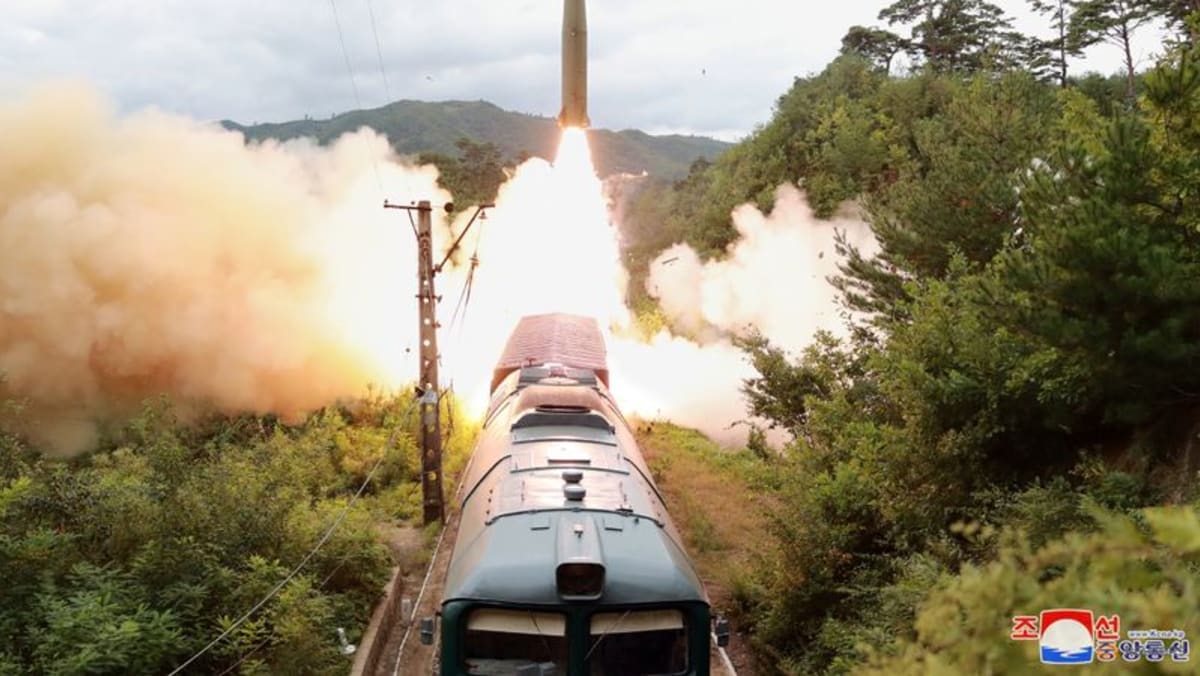
SEOUL: The missiles fired by North Korea on Wednesday (Sep 15) were a test of a new "railway-borne missile system" designed as a potential counter-strike to any forces that threaten the country, state news agency KCNA reported on Thursday.
The missiles flew 800km before striking a target in the sea off North Korea's east coast, KCNA said.
On Wednesday, South Korean and Japanese authorities announced they had detected the launch of two ballistic missiles from North Korea, just days after it tested a cruise missile that analysts said could have nuclear capabilities.
The North Korean launches came the same day that South Korea tested a submarine-launched ballistic missile (SLBM), becoming the first country without nuclear weapons to develop such a system.
The two Koreas have been in an increasingly heated arms race, with both sides unveiling new, more capable missiles and other weapons.
The tests by nuclear-armed North Korea drew international condemnation and concern, however, with the United States saying they violated UN Security Council resolutions and posed a threat to Pyongyang's neighbours.
North Korea has been steadily developing its weapons systems, raising the stakes for stalled talks aimed at dismantling its nuclear and ballistic missile arsenals in return for US sanctions relief.
The North Korean test was conducted by a railway-borne missile regiment that had been organised earlier this year, the KCNA report said.
"The railway-borne missile system serves as an efficient counter-strike means capable of dealing a harsh multi-concurrent blow to the threat-posing forces," said Pak Jong Chon, a North Korean marshal and member of the Presidium of the Politburo of the ruling Workers' Party of Korea, who oversaw the test, according to KCNA.
'CHEAP AND RELIABLE'
Photos released by state media showed an olive-green missile rising on a column of smoke and flame from the roof of a train parked on tracks in a mountainous area.
South Korea had reported the missiles were fired from the central inland area of Yangdok.
"Rail mobile missiles are a relatively cheap and reliable option for countries seeking to improve the survivability of their nuclear forces," Adam Mount, a senior fellow at the Federation of American Scientists, said on Twitter. "Russia did it. The US considered it. It makes a ton of sense for North Korea."
Mount and other analysts said the system is likely constrained by North Korea's relatively limited and sometimes unreliable rail network, but that it could add another layer of complexity for a foreign military seeking to track and destroy the missiles before they are fired.
According to KCNA, Pak said there are plans to expand the railway-borne missile regiment to a brigade-size force in the near future, and to conduct training to gain "operational experience for actual war."
The army should prepare tactical plans for deploying the system in different parts of the country, Pak said.
It is unusual to see the sheer variety in missile delivery systems and launch platforms that North Korea develops, said Ankit Panda, a senior fellow at the US-based Carnegie Endowment for International Peace.
"It’s not very cost effective (especially for a sharply resource-constrained state) and far more operationally complex than a leaner, vertically integrated force," he said on Twitter.
The railway system displayed on Wednesday could possibly set the stage for developing one capable of launching a larger, nuclear-armed intercontinental ballistic missile (ICBM), Panda added.
He also noted that some of the missile systems displayed by North Korea may be about “technology demonstration,” which may not be fully deployed.
https://news.google.com/__i/rss/rd/articles/CBMif2h0dHBzOi8vd3d3LmNoYW5uZWxuZXdzYXNpYS5jb20vYXNpYS9ub3J0aC1rb3JlYS1zYXlzLXRlc3RlZC1uZXctcmFpbHdheS1ib3JuZS1taXNzaWxlLXN5c3RlbS1zdHJpa2UtdGhyZWF0ZW5pbmctZm9yY2VzLTIxODExNTbSAQA?oc=5
2021-09-15 22:38:00Z
52781877468119
Tidak ada komentar:
Posting Komentar